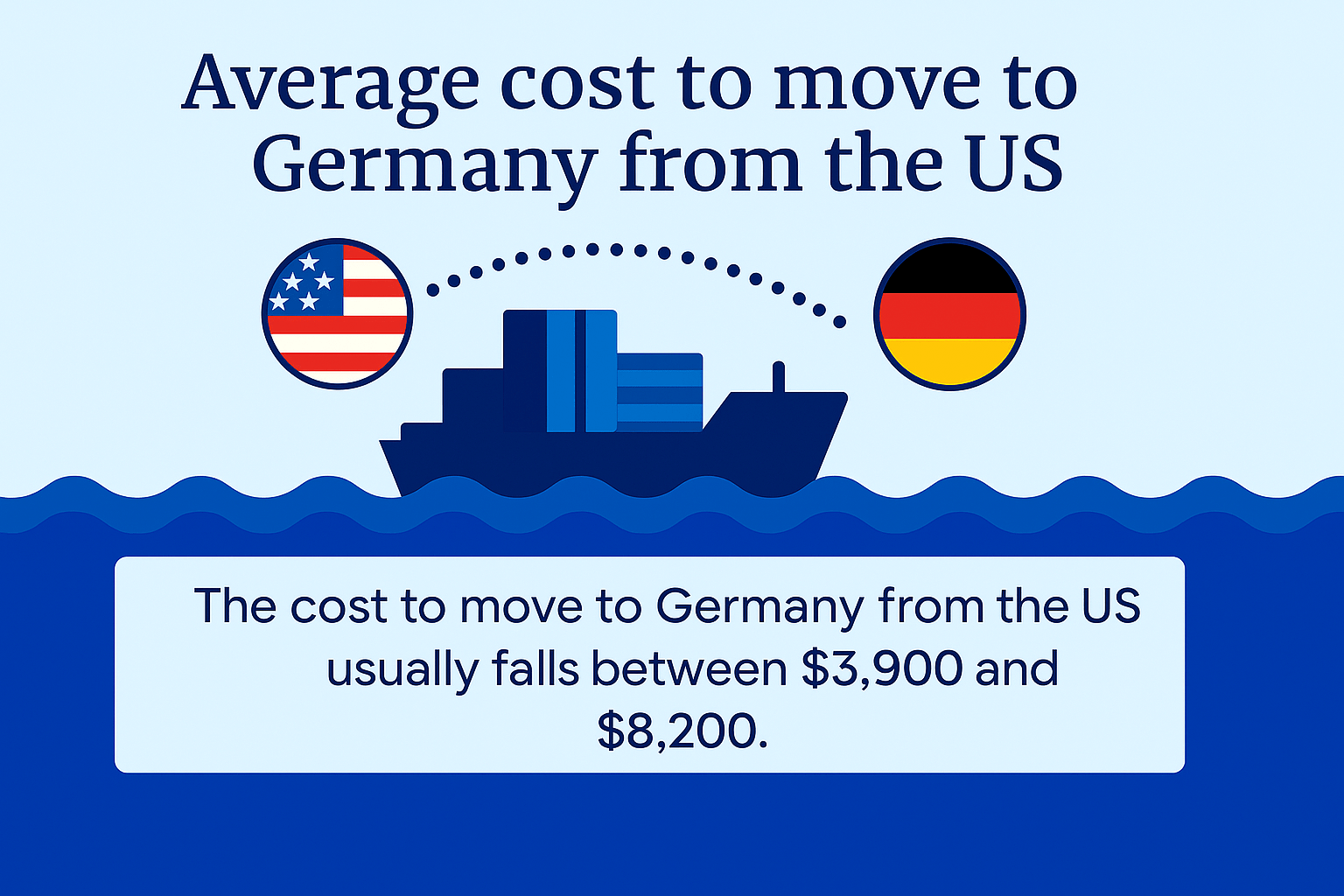How Much Does It Cost To Move to Germany From the US?
The average cost to move to Germany from the US is around $9,800, but you could spend anywhere between $5,000 and $10,000 or more. It all depends on how much stuff you’re bringing and how you ship it, as well as related expenses like visa fees and flights.
Take a look at how those moving costs break down:
- International shipping: A moving company will give you the option for either air or sea freight. Shipping by air is fast but expensive, while sea freight takes longer but is much more affordable.
- Travel: You’ll need to budget for one-way airfare, which can cost $300–$750 depending on when you purchase tickets, the airline, and the seats and extra perks you choose. If you haven’t already arranged for housing in Germany, you should set aside some money for a hotel or Airbnb.
- Initial setup: You’ll need money for a rental and utility deposits. It’s also good to move with at least a month’s worth of living expenses — which in Germany is about $2,030 for a single adult — so you’re covered on rent, bills, groceries, and incidentals.
- Immigration: It typically costs under $200 to apply for a German long-stay visa, but you’ll also need to factor in required pre-departure medical check-ups ($100–$500) before leaving the US, as well as private health insurance ($108–$540/month) that is required of non-residents.
|
|
|
|
If you’re thinking about taking a leap across the Atlantic, your head’s probably spinning with everything you need to do (and pay for). We’ve done the heavy lifting to lay out the major costs and decisions that come with moving to Germany from the USA, including hiring international movers.
Our track record










Average cost to move to Germany from the US
The cost to move to Germany from the US usually falls between $3,900 and $8,200. That range includes both ocean freight and air freight options, so you can strike a balance between cost and convenience.
We based these numbers on shipping a 20-foot container (for your big stuff) and a 220-pound air shipment (for the must-haves you want right away). That way, you can ship the bulk of your goods in a cost-effective way, while keeping your essential items on-hand throughout your move.

Sea freight costs from the US to Germany
Shipping your household goods by sea is the most budget-friendly way to go. It’s the go-to option for international movers for a reason. The downside? You’ll need to wait around four to six weeks for your container to arrive in Germany.
| From | To | Container Cost* | Delivery Timeline |
|---|---|---|---|
| NYC | Frankfurt | $3,230 | 30–41 days |
| Houston | Frankfurt | $3,775 | 35–48 days |
| LA | Frankfurt | $6,000–$7,000 | 45–58 days |
| NYC | Berlin | $4,500–$5,000 | 30–41 days |
| Houston | Berlin | $7,000–$7,500 | 35–48 days |
| LA | Berlin | $6,000–$7,000 | 45–68 days |
Source: Freightos and Sirelo
*Based on a 20-foot container
Air freight costs from the US to Germany
Air freight is the fastest — and priciest — way to get your stuff overseas. It’s not ideal for a full home’s worth of belongings but it’s great for a few boxes of essentials. Think laptops, clothes, and anything you’ll want in-hand as soon as you land.
Air freight weight limits can be anywhere from just 220 pounds for smaller aircraft to up to 1,100 pounds for larger cargo planes. But 1,100 pounds is still much fewer belongings than you could ship via a cargo ship. The total weight of furniture and other belongings in a two-bedroom home is 5,000–6,000 pounds, and in a three-bedroom, it can be as much as 12,000 pounds.
| From | To | Container Cost* | Delivery Timeline |
|---|---|---|---|
| NYC | Frankfurt | $635 | 3 days |
| Houston | Frankfurt | $640 | 3 days |
| LA | Frankfurt | $847 | 3–4 days |
| NYC | Berlin | $770 | 3 days |
| Houston | Berlin | $775 | 3 days |
| LA | Berlin | $769 | 3–4 days |
Source: Freightos
*Based on a 220-pound shipment
How much does it cost to live in Germany?
The cost of living in Germany is about 21% lower than in the US, according to Numbeo. Rent is the big reason — it’s roughly 44% cheaper. Groceries are also more affordable, with average prices around 20% lower than what you’d pay back home.
But here’s the trade-off — wages in Germany are also lower. On average, Americans earn 31.5% more than workers in Germany.
That said, with reduced expenses, many expats find they can still live comfortably. You’d need about $2,030 each month in Germany for rent and other living expenses like utilities and food. In the US, the same monthly expenses are nearly $3,000.
Housing costs in Germany
Rent in Germany is affordable, especially compared to major cities and pricier regions in the US. For example, the price of rent in Frankfurt is right in line with midwestern metro areas like Indianapolis, but it’s almost 60% less than in San Francisco and a staggering 68% cheaper than in NYC.
The opposite is true, though, when it comes to home purchases. If you’re hoping to buy a house or apartment in Germany, the cost per square foot is typically nearly double what it is in the US.
| Apartment | Indianapolis | Frankfurt | % Difference |
|---|---|---|---|
| 1BR rental | $1,580 | $1,371 | –13.2% |
| 3BR rental | $2,408 | $2,465 | +2.4% |
| Price per sq. ft. (purchase) | $181 | $781 | +332.2% |
Source: Numbeo cost of living comparison of Frankfurt and Indianapolis (March 2025)
Here’s what you’ll need when renting in Germany:
- ID or passport
- Proof of income: Recent paystubs or proof of savings
- Bank statements: Usually from the last three months
- Credit report: The German version is called a “SCHUFA-Auskunft”
- Reference: Documentation showing you’ve paid rent on time
To get a head start, check out German apartment rental sites like Immowelt and Expatrio.
Need help picking a city? Here are a few popular expat hubs:
- Berlin: A vibrant city with a creative scene, solid job market, and affordable rent. Lots of English speakers here, too.
- Hamburg: Think green spaces, museums, and a laid-back lifestyle. It’s a great mix of nature and culture… and with reasonable rent prices, to boot.
- Frankfurt: A major financial center with a big international community — over 170 nationalities, including many Americans.
Utilities costs in Germany
At the national level, basic utilities are about 18% more in Germany. They run even higher in larger cities like Frankfurt. But internet and cell phone bills? Way cheaper.
| Utility | Indianapolis | Frankfurt | % Difference |
|---|---|---|---|
| Basic housing utilities* | $207.50 | $352.16 | +69.7% |
| Internet | $71 | $39.38 | –44.5% |
| Monthly cellphone plan | $66.46 | $23.46 | –64.7% |
Source: Numbeo cost of living comparison of Frankfurt and Indianapolis (March 2025)
*Based on the combined cost of electricity, water/sewer, and trash for a 915 square foot apartment (March 2025)
Food costs in Germany
Nationwide, groceries in Germany are cheaper than in the US. But, here again, places like Frankfurt are the exception. You’ll probably spend more on staples at the supermarket, and restaurants tend to be pricier.
Still, if living in a German cultural hub like Frankfurt is your aim, you can keep food costs down by shopping at local markets and discount grocery stores and limiting how often you eat out.
| Food | Indianapolis | Frankfurt | % Difference |
|---|---|---|---|
| Fast food meal | $10 | $11.86 | +18.6% |
| 3-course meal at a mid-range restaurant | $67.50 | $86.24 | +27.8% |
| Gallon of milk | $3.02 | $5.09 | +68.2% |
| 1 dozen eggs | $3.08 | $3.81 | +23.7% |
Source: Numbeo cost of living comparison of Frankfurt and Indianapolis (March 2025)
Transportation costs in Germany
Public transportation in Germany is top-notch — and way more affordable than owning a car. Gas per gallon is more than double what you’d pay in the States. That’s certainly something to consider if you’re planning on buying a new car in Germany (spoiler alert: those are more expensive, too) or shipping your car overseas.
You’ll spend a lot less on transportation if you stick to buses and trains. A monthly transit pass is affordable and gives you access to an extensive train, bus, and tram network. In fact, Germany’s safe, clean mass transit is one of many reasons we named it one of the top European countries to move to from the US.
| Transportation mode | Indianapolis | Frankfurt | % Difference |
|---|---|---|---|
| One-way public transit ticket | $1.75 | $3.93 | +124.8% |
| Monthly public transit pass | $60 | $60.37 | +0.6% |
| 1 gallon of gas | $3.40 | $7.20 | +112% |
| New car* | $24,685 | $31,664 | +28.3% |
Source: Numbeo cost of living comparison of Frankfurt and Indianapolis (March 2025)
*Based on the cost of Toyota Corolla Sedan 1.6l 97kW Comfort or equivalent new vehicle (March 2025)
Education costs in Germany
If you’re hoping to raise your family abroad, you’re in luck. Private preschool and international school tuition in Germany is significantly more affordable than in the US.
Bonus: Many public schools offer solid instruction in English — especially in bigger cities. So, enrolling your kids in an international school isn’t always necessary, but it’s a viable option if you prefer it.
| School type | Indianapolis | Frankfurt | % Difference |
|---|---|---|---|
| Full-day private preschool/kindergarten (monthly) | $1,855 | $574 | –69% |
| International primary school (annual) | $27,350 | $15,050 | –45% |
Source: Numbeo cost of living comparison of Frankfurt and Indianapolis (March 2025)
Germany’s visa & immigration requirements
Like most EU countries, Germany requires you to apply for a long-stay visa if you’ll be in the country longer than 90 days.
Here are your long-stay options:
- Blue Card: The program fast-tracks highly skilled workers and academics to a permanent resident status — two years instead of five. A Blue Card visa also allows more travel to and from Germany (and for longer periods) while a non-citizen.
- Freelancer/self-employed: If you’re an entrepreneur, a remote worker, or a freelancer for German businesses, you can stay for up to three years on this visa. However, you’ll first have to prove you have the income or savings to do so.
- Job seeker: Similar to countries like Portugal, Germany has a special visa for those who don’t yet have employment within the country. So, rather than wait until you have a job offer from a German employer to move, you can hop on a plane to pound pavement for work in person for up to six months.
- Family: If you have close family members (a spouse, children, or dependent parents) who are already German citizens, you can reunite with them on a family visa, which is good for up to five years.
After five years of living in Germany, you can apply for permanent residence. Most folks will need to pass a basic German language test (B1 level) as part of the process.
Moving to Germany from the US
Even though visa paperwork can wait until you’re in Germany, we strongly recommend locking down a job and short-term housing before making your move.
Then, gather quotes from at least three moving companies. In addition to loading and packing services, an experienced international mover has the know-how to navigate the shipping process and can accommodate overseas relocation needs like long-term storage and car shipping.
Top international moving companies
Good news — Germany doesn’t charge import duties on household goods if you’re moving there permanently. Still, you’ll want an international moving company that knows the ins and outs of customs paperwork so your stuff doesn’t get delayed at the port.
Here are our recommendations:
|
|
|
|
|
|
Shipping your vehicle to Germany
Shipping a car from the US to Germany typically costs between $1,000 and $5,000. Considering the higher price of buying a car in Germany, shipping your current vehicle might actually save you money.
Some moving companies — like International Van Lines and JK Moving Services — offer auto transport as an add-on. Bundling this service can simplify your planning and reduce the hassle.
Start by getting quotes from these top-rated car shippers:
|
|
|
|
Tips for moving to Germany from the US
Planning ahead is everything when it comes to international moves. A moving abroad checklist is a great way to lay out timelines and stick to budgets.
Here are some expert tips to put on your checklist:
- Learn some German. Even a basic understanding will help with everyday life — and it’s essential for getting permanent residency.
- Pack it yourself. Hiring movers to pack for an overseas move can cost thousands. Start early, pack a few boxes at a time, and save money while staying organized.
- Declutter before you go. Downsizing ahead of a move is just using good common sense, since the less stuff you have, the lower your moving costs will be. Sell, donate, or store what you don’t need.
- Get multiple moving quotes. Don’t settle for the first offer. Comparing quotes helps you spot red flags and find the best value. Be sure to look for companies that price match competitors or offer moving discounts that can help you save a little money.
FAQ
Is it easy to move to Germany from the US?
What are the benefits of moving to Germany?
How much money do you need to move to Germany?
Can I move to Germany without a job?
What salary is needed to live comfortably in Germany?
Our rating methodology
At moveBuddha, we understand that all moving and car shipping companies aren’t created equal. We undertake a rigorous review process to rate and review companies to ensure we provide accurate recommendations.
This is the breakdown of the methodology we use to rate moving companies:
- Customer satisfaction: In addition to looking at reviews with the BBB, Google, and other third-party sites, we rely heavily on interviews with Better Moves Project participants to understand the pros and cons of each company.
- Standard services: The services that are included as part of a company’s standard offerings — and which ones you can only get for an additional fee — affect a company’s rating.
- Reputation: We evaluate a company’s industry ratings, including aspects like carrying sufficient insurance coverage and compliance with applicable regulations.
- Add-on services: We look at any add-on services that can simplify a move — such as customized crates and special handling of large or fragile items — as well as services that aren’t offered by all moving companies.
- Availability: The areas a company serves — as well as whether they offer local, long-distance, or international services — is another important consideration. Widespread availability is most useful.
- Payment: Ease of making a payment (including submitting a deposit) with multiple options (credit card, check, cash, etc.) can also make moving easier.
- Scheduling: How easy is it to book a moving container? What kind of lead time is needed? Readily available booking services and streamlined scheduling will help get your move underway.
Not what you were looking for?
Check out other categories that can help you find the information you need!










